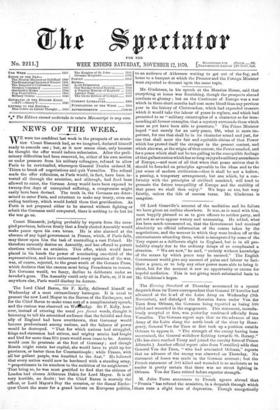Mr. Gladstone, in his speech at the Mansion House, said
that everything at home was flourishing, though the prospects abroad continue so gloomy ; but on the Continent of Europe was a war which in three short months had cost more blood than any previous year in the history of Christendom, which had expended treasure which it would take the labour of years to replace, and which had presented to us "military catastrophes of a character so far tran- scending all former examples, that a mystery surrounds them which none as yet have been able to penetrate." The Prime Minister hoped "not merely for an early peace, bid, what is more im- portant, for one that shall be in its character sound and just, for one that shall meet the fair and equitable claims of that Power which has proved itself the stronger in the present contest, and which also was, at the origin of that contest, the Power assailed, and for a peace which shall not be too galling to the susceptible feelings of that gallant nation which has so long enjoyed a military ascendance of Europe,—and most of all that when that peace arrives that it should be founded on principles agreeable to the ideas and to the just sense of modern civilization—that it shall be not a hollow, a passing, a temporary arrangement, but one which, by a con- formity with the principles of civilized mankind, will tend to promote the future tranquillity of Europe and the stability of that peace we shall then enjoy." We hope so too, but very faintly, unless the tide of success turns. Mr. Gladstone is sanguine.


































